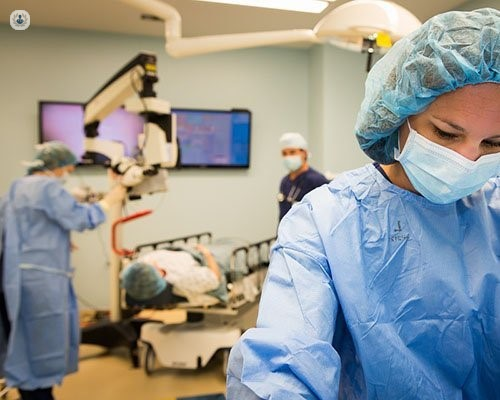Hip replacement recovery: Practical tips
Escrito por:Recovering from hip replacement surgery involves a multifaceted approach aimed at restoring mobility, reducing pain, and improving overall quality of life.
Here, Mr Hugh Apthorp, renowned consultant orthopaedic and trauma surgeon in London with specialist expertise in hip replacement, shares valuable insights and practical tips to support patients in their postoperative journey.

How should I practise my postoperative exercises?
Patients should do their postoperative exercises exactly as instructed, following the specified amount precisely. Doing twice the number of postoperative exercises will not result in patients recovering twice as fast - in fact, doing so will only slow down their progress.
When should I stop taking painkillers?
In most cases, what happens is that patients feel nice and comfortable, they are able to walk without difficulty, and so they think, “Oh, I’ll stop taking my painkillers now.” However, the issue here is that patients then wake up the next day and find themselves unable to get out of bed.
The reason why it is recommended not to give up painkillers quickly is that it is very helpful to have low-grade painkillers in the background – which can just be paracetamol or something similar – to help take the edge off things, allowing the patient to do their exercises and then progress more quickly in their recovery.
So, patients should not give up their painkillers too quickly, and certainly, should not stop them all at once.
How soon can I resume my daily activities?
In most cases, patients have an incredibly optimistic view before an operation on how they are going to progress and what they will be able to do, particularly in relation to work.
What patients should do instead is give themselves some time. They should communicate to others that their recovery is going to take longer than it really will, and then slowly introduce things on their own terms so that they can achieve them easily.
So, patients should not communicate at work that they will be able to return in two weeks, for example. Instead, patients should provide a longer estimation and then return to work on their own terms because they will then find it less stressful.
Will I need crutches?
I will show my patients that they can walk without their crutches before they leave the hospital. It is important, though, that patients use their crutches to help rehabilitate their muscles without overstretching or overstressing them.
The crutches are there to help patients walk normally again and progress with the best outcome. Patients who give up their crutches too quickly often progress more slowly, so it is important that patients don’t regard their crutches as a sign of failure.
At some point, patients will forget about their crutches, and that is when it is time to give them up.
How much should I rest after hip replacement?
Patients should always try to rest during the day. In most cases, what will happen after surgery is that patients will feel quite tired to start with, so they will naturally need to factor in rest in their recovery. It is not a bad thing to feel tired; it is just another part of the rehabilitation process.
So, in the afternoons, patients should factor in a bit of time to relax and have a rest, putting their feet up. If patients try to work through the whole day without resting, by the end of the day, they will be going backwards in their recovery, not forwards.
To schedule an appointment with Mr Hugh Apthorp, head on over to his Top Doctors profile today.


